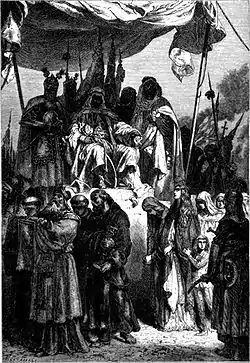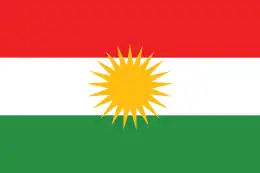Kurds in Palestine
Kurds in Palestine (Kurdish: Kurdên Filistînê; Arabic: اكراد فلسطين: Akrad Filisteen) are Palestinians who are of Kurdish ancestry.
| Regions with significant populations | |
|---|---|
| Harat Al-Akrad, Hebron[1] | |
| Languages | |
| mainly Arabic | |
| Religion | |
| Sunni Islam | |
| Related ethnic groups | |
| other Kurdish people,[2] Palestinians & Kurdish Jews |
 |
History
The origins of some Palestinian Kurds can be traced to the era of conquests of Kurdish Ayyubid dynasty during the Crusades. The Ayyubid rulers settled many Kurdish tribes in Palestine in order to secure the borders of their empire. Among the major settlements with Kurdish communities in Palestine are city of Hebron (al-Khalil), Jerusalem (al-Quds) and Shechem (Nablus).
There are also many Kurdish clans who came to Palestine at post-Ayyubid periods, especially under the Ottomans. The Kurds are the largest ethnic minority in the West Bank.[3]
Hebron
The Kurdish Muslim Saladin retook Hebron in 1187 – again with Jewish assistance according to one late tradition, in exchange for a letter of security allowing them to return to the city and build a synagogue there.[4] The name of the city was changed back to Al-Khalil. A Kurdish quarter still existed in the town during the early period of Ottoman rule.[5] Richard the Lionheart retook the city soon after. Richard of Cornwall, brought from England to settle the dangerous feuding between Templars and Hospitallers, whose rivalry imperiled the treaty guaranteeing regional stability stipulated with the Egyptian Sultan As-Salih Ayyub, managed to impose peace on the area. But soon after his departure, feuding broke out and in 1241 the Templars mounted a damaging raid on what was, by now, Muslim Hebron, in violation of agreements.[6]
Some claim that as much as one third of inhabitants of Hebron are of Kurdish origin, where they have had their own quarters, such as Harat al-Akrad (English: Quarter of Kurds).[3][7]
Notable people
See also
References
- "How Palestinians came to reject Kurdish demands for a homeland". www.newarab.com/?amp=1. Retrieved 2023-08-11.
- "The President of the Iraqi Kurdistan Region receives a delegation from Hebron Municipality and welcomes the opening of a PNA office in Arbil |". hebron-city.ps. Retrieved 2017-11-26.
- "Who are the Palestinians?". Israel National News. 11 August 2017. Retrieved 2017-11-26.
- Gil 1997, p. 207. Note to editors. This account, always in Moshe Gil, refers to two distinct events, the Arab conquest from Byzantium, and the Kurdish-Arab conquest from Crusaders. In both the manuscript is a monkish chronicle, and the words used, and event described is identical. We may have a secondary source confusion here.
- Sharon 2003, p. 297.
- Runciman 1965c, p. 219
- Roger Hercz (25 September 2017). "How Palestinians came to reject Kurdish demands for a homeland". alaraby.co.uk. Retrieved 2017-11-26.
- "The Palestinian who was all of Palestine". Gods News Agency. 10 July 2020.
Works cited
- Gil, Moshe (1997) [1983]. A History of Palestine, 634–1099. Translated by Ethel Broido. Cambridge: Cambridge University Press. ISBN 0-521-59984-9.
- Runciman, S. (1965c) [1954]. A History of the Crusades:The Kingdom of Acre and the Later Crusades. Penguin Books. ISBN 978-0-521-34772-3. Retrieved 26 July 2011.
- Sharon, M. (2003). "Palestine Under the Mameluks and the Ottoman Empire (1291–1918)". In Avi-Yonah, M. (ed.). A History of Israel and the Holy Land. Continuum International Publishing Group. pp. 272–322. ISBN 978-0-8264-1526-4. Retrieved 20 July 2011.

